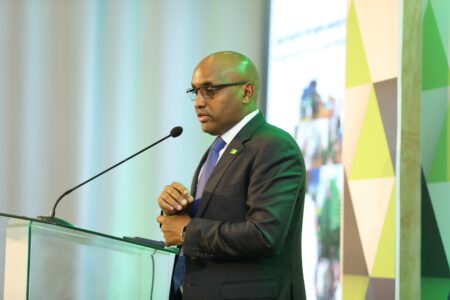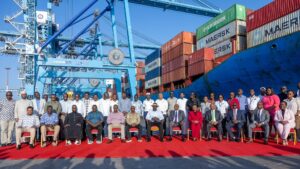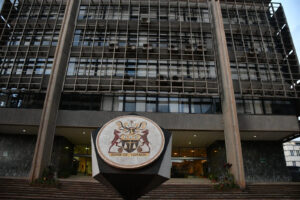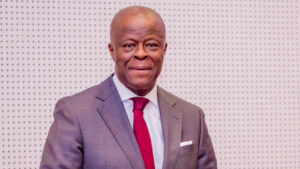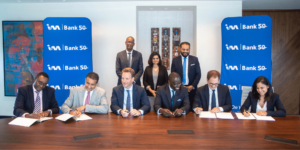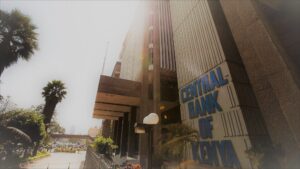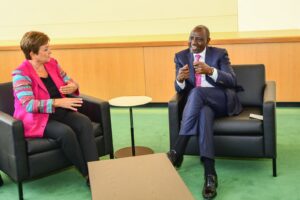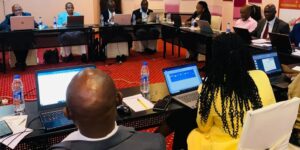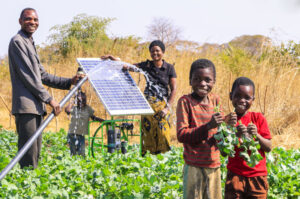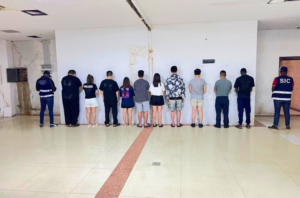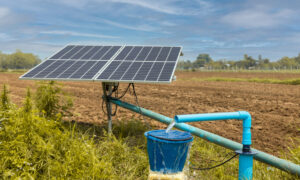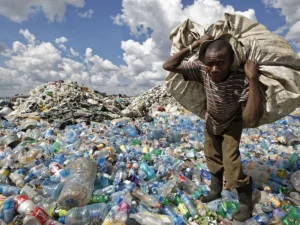- Africa’s BPO industry enters AI era with 40% of tasks at risk by 2030
- Trump tariffs sting set to ruffle several economies in Africa
- Africa Energy Bank secures key backing from Nigeria, Angola and Ghana
- AIM Congress 2025 gets a boost as International Development Bank signs on as gold sponsor
- African energy: Opportunities and challenges presented by Russia’s investments
- Africa’s smart farming push—a revolution or a mirage?
- BRICS summit in Brazil to focus on global governance reform
- Dedollarization: BRICS take on Trump and mighty dollar
Banking
- The Board has proposed a final dividend of $0.012 per share, bringing the total payout for the year to $0.023 per share—amounting to $74 million.
- Lender’s balance sheet closed the year at $15.13 billion (KSh1.96 trillion), powered by a strong deposit growth and stable loan portfolio.
- Operating costs grew by 11.8% to $717 million (KSh92.9 billion), driven by staff costs, and tech investments.
KCB Group profit after tax for the full year 2024 grew by 64.8 per cent to $477 million (KSh61.8 billion), attributable to strong expansion across all its businesses subsidiaries in the East African market.
This performance was an increase from the $289.5 million (KSh37.5 billion) which the bank that has presence in Kenya, Uganda, Tanzania, Rwanda, Burundi, the Democratic Republic of Congo (DRC) and South Sudan reported during a similar period in 2023.
“The strong performance illustrates our resolve over the past 3 years to build an …
- An alliance of two UK institutions—the Ghana International Bank and the British International Investment (BII)—is tailored to address trade finance needs in key African markets.
- The two institutions have committed $50 million in trade finance facilitation targeting industry stakeholders in Rwanda, Tanzania, Sierra Leone, Liberia, The Gambia, Benin, the DRC.
- The financing plan seeks to plug banking industry gaps that continue to perpetuate general lack of credit appetite for frontier markets in Africa.
A UK-based African financial institution, the Ghana International Bank has entered into a $50 million trade finance agreement with British International Investment (BII) to fund organisations in eight countries across the continent.
In a statement on Monday, the UK’s development finance institution (BII) said the trade finance facility will target investments in Tanzania, Rwanda, Sierra Leone, Liberia, The Gambia, Benin, and in the Democratic Republic of Congo.
“I’m delighted to see two UK institutions coming together to …
- Part of Afreximbank’s funding will go to Dongo Kundu Industrial Park within the Mombasa Special Economic Zone.
- Another chunk will finance the construction of Naivasha II SEZ that includes a free trade zone, an industrial park, a logistics zone and a public utility area.
- The Naivasha II project will also derive value from its strategic position as it sits on the gateway to East and Central Africa through the Northern Corridor Transport System that serves Uganda, South Sudan, DRC among other countries.
The Afreximbank has entered into a financing agreement with Kenya to finance the development of industrial parks, special economic zones, and export-oriented manufacturing projects to the tune of $3 billion.
In an update, the trade development lender said this three-year investment plan will be critical in bolstering Kenya’s export manufacturing at a time when the East African nation is keen on reviving its ailing manufacturing industry.
“These Parks …
- Kenya’s bilateral loans data show that the Asian giant is still a major lender to Kenya mainly for the development of roads rails and port infrastructure.
- The country’s debt as of March 2024 comprised of $80.9 billion (Sh10.4trillion) comprising $40.5 billion (Sh5.2 trillion) domestic and same amount in external loans.
- In the past three months the strong shilling has come in handy in helping the state reduce its debt.
Kenya owes China $7.2 billion (Sh920.52 billion) in loans making it the leading lender by country rankings, even as President William Ruto looks west for more financing and trade cooperation.
Official data shows the Asian giant is still a major lender to Kenya mainly for the development of roads rails and port infrastructure.
It is the second biggest majorl lender after the World Bank, whose credit line to Kenya is currently at an estimated $14 billion (Sh1.8 trillion)
The country’s debt …
- The World Bank has approved a $2.25 billion loan for Nigeria to shore up revenue and support economic reforms.
- $1.5 billion of the loan will help protect millions who have faced growing poverty since a year ago.
- $750 million, the bank said, will support tax reforms and revenue and safeguard oil revenues threatened with limited production caused by chronic theft.
Nigerian President Tinubu’s economic reforms, including ending decades-long but costly fuel subsidies and unifying the multiple exchange rates have resulted in surging inflation that is at a 28-year high.
Under growing pressure from citizens and workers protesting the hardship, Tinubu’s government said that it was seeking the loan to support its long-term economic plans.
The government said it was also taking steps to boost foreign investment inflows which fell by 26.7 per cent from US$5.3 billion in 2022 to US$3.9 billion in 2023, according to the Nigerian Economic Summit Group …
-
- The transaction marks the successful outcome of BII and I&M’s equity partnership for over 7 years as AfricInvest takes over.
- The institution said that the sale to a like-minded investor is one of the most significant transactions in East Africa in recent years and represents a vote of confidence in the region’s financial services sector.
- It is listed on the Nairobi Securities Exchange, and the Rwandan subsidiary I&M Bank Rwanda PLC is listed on the Rwanda Stock Exchange.
British International Investment (‘BII’)
- British International Investment (‘BII’), the UK’s development finance institution and impact investor, has sold its 10.1 per cent stake in I&M Group PLC, the Eastern African banking group, to AfricInvest, a leading Pan-African Asset Management platform.
The acquisition was made through East Africa Growth Holding, a special-purpose vehicle owned by AfricInvest.
- I&M Group PLC is a leading banking group in Eastern Africa with a presence in Kenya,
-
- (CBK) retained its base lending rate at a high of 13 per cent for the second time.
- This is the highest rate in 12 years, as the apex bank continues implementing monetary policies to manage stubborn inflation.
- According to CBK data, the country’s borrowers had defaulted on about $4.8 billion as of April, the highest in 18 years, due to the tough credit market.
Central Bank of Kenya (CBK) retains high interest rates
Central Bank of Kenya (CBK) retained its base lending rate at a high of 13 per cent for the second time driving the borrowing costs in Kenya to remain high for at least the next two months.This is the highest rate in 12 years, as the apex bank continues to implement monetary policies intended to manage the stubborn inflation, which slightly increased to 5.1 per cent last month from five per cent in April.
- The base-lending
- President Ruto calls for reforms in the IMF to address emerging global challenges and seeks flexible lending instruments, equitable special drawing rights, and debt financing plans.
- He also advocates for governance reforms to better represent the Global South’s economic and demographic contributions.
- These changes are crucial for maintaining the IMF’s relevance and effectiveness in fostering stability and sustainable development.
In a rapidly evolving global economy, the International Monetary Fund (IMF) finds itself at a critical moment as President William Ruto of Kenya articulates in the latest issue of the IMF’s Finance and Development Magazine. With over eight decades of history, the IMF’s journey from supporting the gold standard to promoting flexible exchange rates and development financing mirrors the dynamic changes in the global financial architecture.
President Ruto says that the IMF has to adapt once again, highlighting four key areas for reform: lending instruments, special drawing rights (SDRs), addressing …
- Financial markets provide liquidity essential for bolstering economic growth and stability.
While well-regulated financial systems are essential for macroeconomic stability - Good financial markets are critical in channeling resources into productive investment and fostering growth.
- Strengthening judicial systems and enforcing regulations are thus central to deepening financial systems. Protecting creditors‘ and borrowers‘ rights, enforcing contracts, and establishing transparent information-sharing mechanisms are also prerequisites for financial deepening.
Financial markets play a vital role in enhancing the smooth operation of economies by allocating resources and creating liquidity for businesses and entrepreneurs. The markets make it easy for investors and traders to trade their holdings. They additionally create security products that provide returns for investors/lenders and make these funds available to those needing extra financing.
Stock market, bond market, forex, commodities, and the real estate market, just to name a few, are examples of commodities in financial markets. Moreover, they can be divided into …





